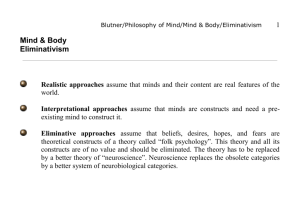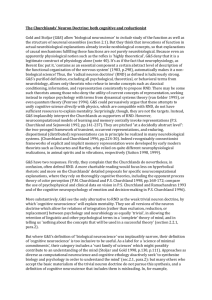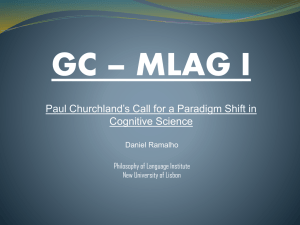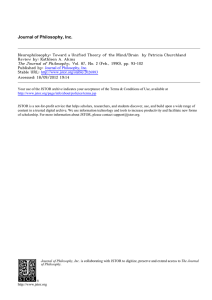Eliminativism
advertisement
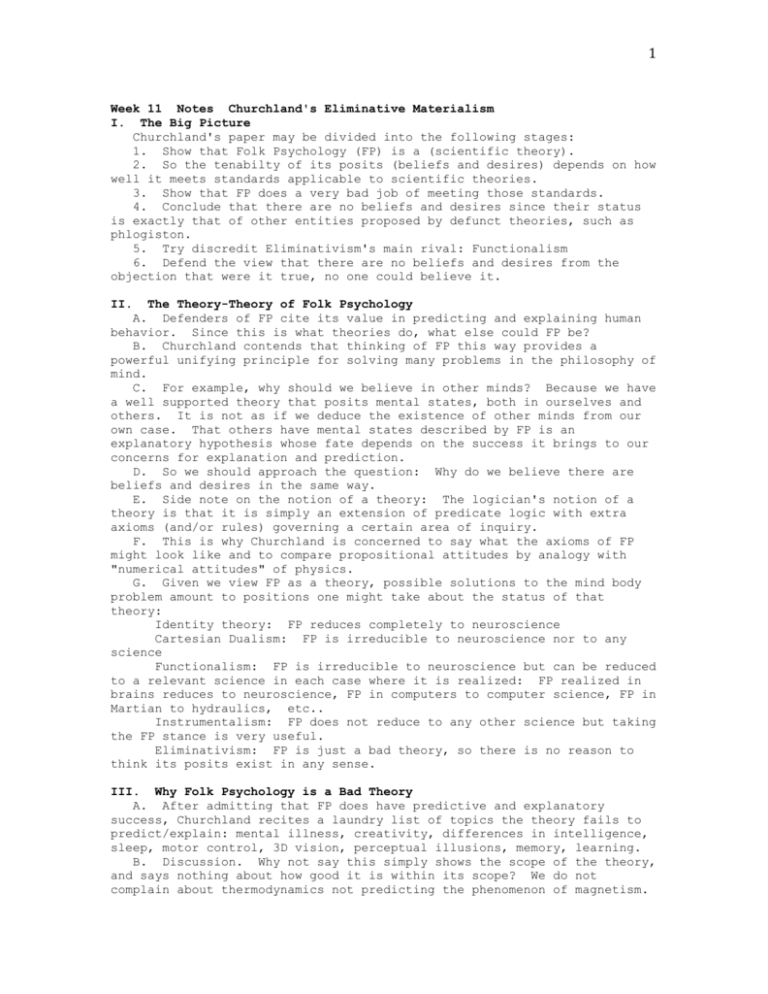
1 Week 11 Notes Churchland's Eliminative Materialism I. The Big Picture Churchland's paper may be divided into the following stages: 1. Show that Folk Psychology (FP) is a (scientific theory). 2. So the tenabilty of its posits (beliefs and desires) depends on how well it meets standards applicable to scientific theories. 3. Show that FP does a very bad job of meeting those standards. 4. Conclude that there are no beliefs and desires since their status is exactly that of other entities proposed by defunct theories, such as phlogiston. 5. Try discredit Eliminativism's main rival: Functionalism 6. Defend the view that there are no beliefs and desires from the objection that were it true, no one could believe it. II. The Theory-Theory of Folk Psychology A. Defenders of FP cite its value in predicting and explaining human behavior. Since this is what theories do, what else could FP be? B. Churchland contends that thinking of FP this way provides a powerful unifying principle for solving many problems in the philosophy of mind. C. For example, why should we believe in other minds? Because we have a well supported theory that posits mental states, both in ourselves and others. It is not as if we deduce the existence of other minds from our own case. That others have mental states described by FP is an explanatory hypothesis whose fate depends on the success it brings to our concerns for explanation and prediction. D. So we should approach the question: Why do we believe there are beliefs and desires in the same way. E. Side note on the notion of a theory: The logician's notion of a theory is that it is simply an extension of predicate logic with extra axioms (and/or rules) governing a certain area of inquiry. F. This is why Churchland is concerned to say what the axioms of FP might look like and to compare propositional attitudes by analogy with "numerical attitudes" of physics. G. Given we view FP as a theory, possible solutions to the mind body problem amount to positions one might take about the status of that theory: Identity theory: FP reduces completely to neuroscience Cartesian Dualism: FP is irreducible to neuroscience nor to any science Functionalism: FP is irreducible to neuroscience but can be reduced to a relevant science in each case where it is realized: FP realized in brains reduces to neuroscience, FP in computers to computer science, FP in Martian to hydraulics, etc.. Instrumentalism: FP does not reduce to any other science but taking the FP stance is very useful. Eliminativism: FP is just a bad theory, so there is no reason to think its posits exist in any sense. III. Why Folk Psychology is a Bad Theory A. After admitting that FP does have predictive and explanatory success, Churchland recites a laundry list of topics the theory fails to predict/explain: mental illness, creativity, differences in intelligence, sleep, motor control, 3D vision, perceptual illusions, memory, learning. B. Discussion. Why not say this simply shows the scope of the theory, and says nothing about how good it is within its scope? We do not complain about thermodynamics not predicting the phenomenon of magnetism. 2 C. Next Churchland argues that FP shows a history of "retreat. infertility, and decadence," p. 7 Why? Adopting FP to cover the behavior of nature commonplace in the past, but we have learned that is a bad idea. Even in the realm of human behavior, FP has not changed in thousands of years. D. Finally, FP takes no part in the revolution in science that has brought just about everything under its purview. It is especially worrisome that it plays no role in the latest advances in cognitive science. It seems that its categories are "incommensurable with, or orthogonal to, the categories of the background physical science whose long term claim to explain human behavior seems undeniable." p. 9 E. Discussion. Can anybody do higher-level cognitive science without buying into FP categories? IV. The Functionalist's Rebuttal A. You misunderstand. FP is not so much an empirical theory as an abstract normative one (think of Millikan's take on normalizing explanation). In the same way that a functionalist account of a car need not predict its behavior when it malfunctions, and the flight of deer need not predict the presence of a predator, so failure of prediction is not a defect in a normative theory that appeals to beliefs, desires and perfect rationality. FP is essential and eliminable because it presumes abstract normative standards under which to view behavior, and this viewpoint is at the core of what it is to have a mind with intentionality. The whole conception of rationality, which defines the inferential relationships between beliefs, desires and their contents is unassailable as a norm for behavior, a norm, by the way, that is generally followed in practice. B. Churchland thinks this reply is misguided, reactionary, and in fact dangerous. You could protect any bad theory this way. He parodies the functionalist by describing a parallel defense of alchemy. C. Furthermore, it is far from clear that FP really is the normative theory that functionalists claim it is. 1. That inferential relations appealed to in an account of beliefs, desires, and their contents may show there are regularities to explain, but not that these regularities are normative. 2. The idea that FP rests on high standards for rationality is overblown. Failure of the prediction of rational behavior by the theory is not to be explained away by citing human failure to live up to standards that never were in play. That failure simply shows failure of FP (not humans) to live up to its standards. 3. The idea that a conceptual framework that involves mental states with language-like properties such as content is a viable one flies in the face of what we know about the brain. Linguistic abilities are evolutionarily very late and peripheral. That a full understanding of human behavior could be built from such a limited set of cognitive abilities seems far-fetched. D. Discussion: What do you make of this: "FP is nothing more and nothing less than a culturally entrenched theory of how we and higher animals work. It has no special features that make it empirically invulnerable, no unique functions that make it irreplaceable, so special status of any kind whatsoever." p. 17 V. A Connectionist Alternative A. Some replacement for FP is in order, and Churchland opts for some brand of a connectionist theory. The theory makes it clear that languagelike representation of what is going on in cognition is intrinsically shallow, given the extremely rich representational resources of the brain. 3 (Think of perceptual representation of the world in vision and then what we could describe of it in words.) B. Churchland has the guts to imagine that such a connectionist alternative conceptual scheme could be created and the adopted in the future so that FP terminology would drop out (in the way that the 4 humors now has dropped out of the conceptual scheme for medicine). He even considers the wilder thought that we could learn to communicate directly with each other as the two hemispheres of a brain communicate. Then it is unlikely we would attribute language-like states to each other. The idea here is to make it clear that attribution of language-like content to brains may be the artifact our limited linguistic forms or communication, rather than part of the correct story about human cognition. VI. A Final Shot: Eliminativism is Self-Refuting The argument 1. If eliminativism is true there are no beliefs. 2. If there are no beliefs, then no one can believe eliminativism. 3. So the statement of elimininativism is meaningless. 4. Therefore the statement of eliminativism cannot be true. B. Churchland compares this to a parallel argument. 1. If the view that there are no vital spirits is true then no people are alive. 2. If no one is alive then no one can believe eliminativism. 3. So the statement of eliminativism is meaningless. 4. Therefore the statemnt of eliminativism cannot be true. C. Discussion: The first premise of the parody argument clearly begs the question. But is it clear that the first premise of the target argument has the same status? D. It helps here to distinguish eliminativism with respect to beliefs and desires as explanatory posits, from eliminativism with respect to the phenomena that these posits are adopted to explain. Churchland's view does not entail that the phenomena that we now explain by talking about beliefs should be eliminated. Those are still there, it is just that we need a better theory of them. The conceptual scheme we use to talk about those phenomena needs a radical revision. Similarly, the person who proposes an alternative science of life without bringing in vital spirits does not advocate the view that there is no life, but only the view that that very phenomenon we describe with talk of vital spirits should not be so described, but should be brought under a new conceptual scheme. A.
